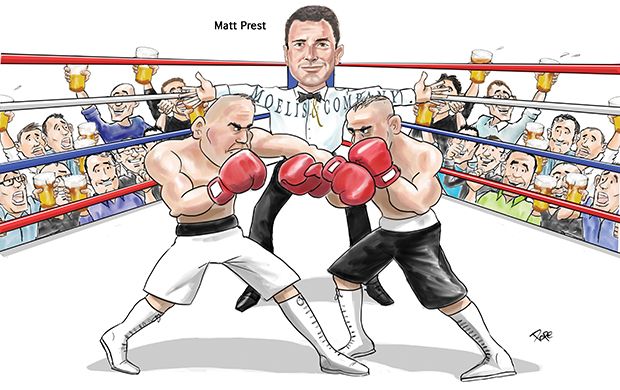After seven years at Moelis & Co, co-heads of restructuring William Derrough and Thane Carlston have put together a team with global reach and the depth of skill that makes it a formidable competitor. It stood out in another year of easy credit conditions by solving the trickiest problems, and is IFR’s Restructuring Adviser of the Year.
Restructurings remained few and far between in 2014. For much of the year, credit markets were benign, as investors sought ever riskier propositions in their hunt for enhanced yield. This enabled many debtors to refinance more easily than might have been the case in tougher conditions.
Making your mark in a market that made advisers to both debtors and creditors look good took some doing. On a number of occasions over the past year, however, Moelis managed to do this. Although not as active as some other houses, the firm, founded only in July 2007, stood out when it was engaged by clients to sort out particularly thorny problems.
Co-operative solution
Nowhere was this more critical and necessary than with the Co-operative Bank. The UK lender, whose £44bn of assets makes it one of the largest banks in the country, was adjudged by the Prudential Regulation Authority to have a £1.5bn capital hole in June 2013.
The bank was wholly owned by the Co-operative Group, a customer-owned conglomerate encompassing grocery stores, funeral parlours and other businesses. The group itself was cash-strapped after buying rival supermarket operator Somerfield at the peak of the market in July 2008.
The group put out a plan to plug the capital gap as soon as it was revealed, which would principally have given bondholders amended instruments but left the group in control of the bank.
“This was presented almost as a fait accompli,” said Matt Prest, co-head of Europe at Moelis.
But that proved not to be the case after Moelis was engaged by some of the bank’s Lower Tier 2 noteholders (who together held a 48% blocking stake). Within three months Moelis and the noteholders had put forward an alternative that would see the notes converted into equity, thus reducing the group’s stake to 30%.
Some may have considered this a rearguard action. Moelis, on behalf of its clients, first made the regulator, which required the hole to be filled by the end of 2013, comfortable with its plan and then persuaded the bank to back the amended scheme, which was then formally approved.
This was a major landmark: the first time in recent history in Europe that creditors agreed to a bail-in without taxpayer support to rescue a bank. Moelis was retained by the bank, now majority owned by its former subordinated bondholders, when it raised equity this year to further dilute the group.
Beyond the impasse
By that stage, the firm had been mandated by another group of junior bondholders with various positions in Punch Taverns. This was one of the most complex European restructurings in recent years, having dragged on for three years without an obvious solution when Moelis was engaged.
Part of the problem arose because many equity holders also had blocking positions across the junior parts of the pub company’s two securitised debt vehicles. Senior bondholders in these also had formed a group that could, and did, block various proposals from the company.
Once a plan that would have seen the securitisation liquidated was blocked, there seemed few options left as to how to break the deadlock. Moelis managed to move beyond the impasse, however, gathering a group of equity and junior noteholders together.
The idea was that this group of seven – Alchemy, Angelo Gordon, Avenue, Glenview, Luxor, Oaktree and Warwick – would swap some of their debt for equity and also subscribe for new equity issued by Punch. This would allow the seniors to accept a milder restructuring of their notes.
No single group could claim to have led on resolving Punch, with more than half a dozen stakeholders all seeking a compromise. However, Moelis’ clients were pivotal, being involved in the equity and junior debt, the two classes that had the most to lose. Putting in new equity was the decisive blow.
Winning hits
In the US, Moelis built upon its reputation as an adviser willing to swing for the fences. Sometimes missing, as it did in 2011 when an overly aggressive plan for Innkeepers was beaten back. Sometimes winning, as it did with chemical maker Momentive Performance Materials.
“Momentive will change the way people look at restructuring plans in the US,” said Carlston. “Companies will certainly look at it when they think about what’s feasible,” he said. And bondholders will need to be prepared to defend against the precedents.
In the final restructuring plan Moelis managed to eliminate US$3bn of debt through an innovative Chapter 11 “cram-up”, backed in a landmark ruling by the courts, that forced secured creditors to remain in place and take a market rate of interest on their notes.
To get its plan passed over the objection of secured creditors, Momentive’s advisers reached for an obscure Supreme Court ruling, “Till”, that allowed the interest rate on secured loan in a personal bankruptcy to be reset near the prime rate. The plan also allowed the company to reject “make-whole” claims advanced by creditors. Both were precedent-setting moves that could have wide-ranging implications.
“It’s a landmark case that will change the calculus of restructuring,” said Derrough.
The firm also achieved a rare feat in getting General Electric to be primed on a secured cashflow revolver. It was necessary in order to get debtor-in-possession financing for Momentive without being at the mercy of first-lien noteholders.
GE’s position was that it would never agree to be primed, said Zul Jamal, a Moelis managing director involved in the restructuring.
“It took as much time to negotiate with GE as it did to complete the US$600m equity commitment,” he said. “Our relationships, logic, articulation of their alternatives finally got them across the line.”
Moelis was also involved in the largest US restructuring completed in the past year: the US$29.6bn workout of American Airlines’ parent AMR, which saw that group merge with US Airways. Moelis, advising the unsecured creditors and was an early advocate of a deal with US Airways, and ultimately it was that deal that allowed creditors to receive full recoveries.
Moelis used its nous to help clients get around difficulties, not only in corporate restructurings but also by helping unwind complex structured finance transactions.
This came to the fore with Master Asset Vehicle II. Moelis worked for hedge funds that wished to monetise their positions in this illiquid C$10bn ABS. This was eventually achieved consensually through organising, with issuer and regulatory approval, five redemption auctions.
The MAV II Notes had been created in 2009 to provide a way for maturing asset-backed commercial paper to be re-financed after the financial crisis. MAV achieved this but was left holding as collateral a wide and esoteric mix of receivables, such as CDOs, Canadian MBS and CDS.
The original noteholders were initially willing to sell out to hedge funds at a discount, and they then engaged Moelis to see if it could persuade MAV’s stakeholders to consent to an early redemption of the notes before they matured in 2017.
Consents were obtained in October 2013 and then the five auctions followed in swift succession, so that by May 2014 notes with a par value of more than C$5bn had been redeemed. Prices cleared above 94 cents on the dollar – and well above the 70s trading levels when Moelis was hired.
Elsewhere, Moelis advised a number of other creditor groups, including senior secured ones in Dubai Group’s US$10.5bn restructuring and Europe’s largest restructuring, the €4.5bn deal for German real estate business IVG Immobilien, where it advised an ad hoc committee of SynLoan II lenders.
The firm was also busy in Central Europe, advising a joint committee of senior and junior noteholders in New World Resources’ €825m restructuring. That saw the Czech coking coal producer switch jurisdiction to the UK before doing a scheme of arrangement and equity raising.
Moelis also advised senior secured noteholders of Hungarian fixed telecoms business Invitel in a recapitalisation that would enable such investors to boost their recoveries in the envisaged medium-term sale of the business, which saw bondholders take a 49% stake post-restructuring.
To see the digital version of the IFR Review of the Year, please click here.
To purchase printed copies or a PDF of this report, please email gloria.balbastro@thomsonreuters.com.




